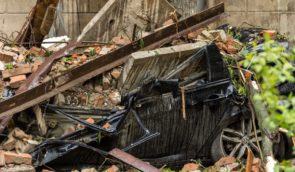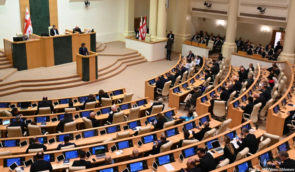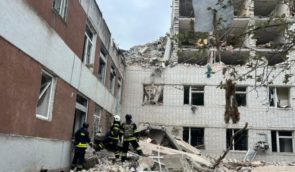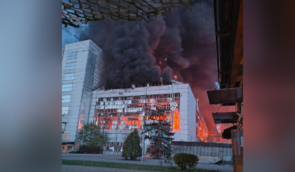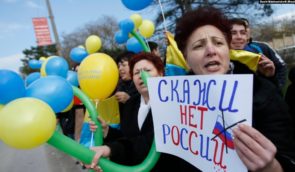Human Rights Advocates: New Wave of Repressions in Crimea
The arrest of Euromaidan activist Oleksandr Kostenko on February 8th in Crimea grossly violates the norms of international law.
This statement was made by representatives of the Ukrainian Helsinki Human Rights Union (UHHRU) and Euromaidan SOS, reports the correspondent of the Human Rights Information Center.
Kostenko, who is being considered a Russian citizen, is accused of violating paragraph b part 2, Art. 115 of the Russian Criminal Code (intentional infliction of light injury on the grounds of political, ideological, racial, ethnic or religious hatred or enmity, or on the grounds of hatred or enmity towards a particular social group).
The last time Kostenko was seen on the mainland of Ukraine was in November 2014. After that, he disappeared. His parents, who live in Crimea, came to Kiev to write a statement about his disappearance and searched for him. After he was arrested, his parents did not go into contact with human rights organizations.
The charges on which the arrest of Oleksandr Kostenko is based are absurd and false, says his friend Stanislav Krasnov.
“The court ruling says that Kostenko ‘while being aware of the events in Kiev, during the mass riots and the overthrow of the constitutional order in Ukraine, as well as being a member of the radical nationalist party Svoboda, arrived at Independence Square in Kiev.’ This is what the beginning of this nonsensical ruling sounds like. Why would Russia judge a citizen of Ukraine, who was committing whatever crimes in the territory of Ukraine, even if he did?” wonders Krasnov.
He denies that his friend committed unlawful acts at Euromaidan.
“It was a peaceful protest, and he carried out exclusively administrative functions. The ruling says what he was arrested for: ‘Arming himself with a 10×10 stone, he threw it into the Berkut warrant officer Palienko. This stone hit Palienko in the arm, and thus paid him a brief, light personal injury,’” Krasnov says quoting the court ruling.
However, according to Krasnov, they were together on Maidan that day and Kostenko did not throw stones. He worked exclusively in medical evacuation from the Oktyabrskiy Palace. Because of the offensive on Oktyabrskiy Palace, there were a lot of wounded people and medical equipment which had to be brought out.
Human rights advocates sent an inquiry to Svoboda to find out if the prisoner is a member. The response was that the man “was not in the leadership of the Crimean Republican organization VO (All-Ukrainian Union) Svoboda, was never a member of the party, did not apply for membership, and never participated in the events organized by VO Svoboda.”
Krasnov received a summons to the office of investigator Odarchenko along with other Euromaidan activists from Crimea. The summons states that all those people are suspected under the same case.
“After the arrest of Oleksandr Kostenko, the FSB, former members of SBU, came to my house for a search. And perhaps to other guys’, because contact was lost with many Euromaidan activists in Crimea,” says Krasnov.
Director of the UHHRU advocacy center Boris Zakharov says that large-scale political persecution of pro-Ukrainian activists has begun on the peninsula.
“Today a system of political persecution of pro-Ukrainian and Crimean Tatar activists has unfolded in Crimea. Now a new wave of persecution of Euromaidan activists for purely for political reasons has begun. Back in March, a Committee for Protection of Maidan Victims was created in Crimea, which was collecting information on the activists, and now we see the consequences of this – a person behind bars. In the case of Oleksandr Kostenko we see violations of the principles of criminal law and the right to a fair trial. In addition, the so-called ‘gray zone’ in Crimea deprives Ukrainian citizens from using legal means to protect themselves,” he said.
Euromaidan SOS Coordinator Olexandra Matviichuk specifies exactly what repressions are now taking place in Crimea.
“Currently there are mass repressions on the occupied peninsula that occur in different forms: with the use of legal mechanisms, as well as in extra-legal forms. Extralegal means kidnapping, torture, beatings of activists, protesters for Ukrainian unity, journalists, community leaders, human rights advocates and representatives of the Crimean Tatar people, who are in systemic opposition to the occupying power. Extralegal persecution includes illegal searches, arrests, initiation of fabricated administrative and criminal cases. We are seeing a new round of persecution against these categories of people. We cannot do anything other than appeal to journalists and the international community,” says Matviichuk.
She adds that by those repressions, the occupation authorities are trying to force people to stop all civil activities, as well as to strengthen their influence.
“Roughly speaking, the occupying power is sending two signals to people who live in Crimea: ‘Shut up or leave! Otherwise, you’ll be thrown in jail,’ says Matviichuk.
She says that the political motives of the prosecution are very easily traced in the court ruling.
“Euromaidan is a peaceful protest. What we call the Revolution of Dignity, this court described as the illegal violent overthrow of the constitutional order. It gives us grounds to say that any Euromaidan participant is a potential recipient of such a court ruling. Look at the absurdity of the charge. Without getting into details of whether he had a stone in his hands or not, this means that Russia prosecutes a citizen of Ukraine for offenses committed on the territory of Ukraine in Kiev last February against a Ukrainian citizen who is also a member of a law enforcement agency, the Crimean Berkut. This is utterly outside any legal framework or common sense!” says Matviichuk.
Human rights advocates recommend Crimeans to properly assess the risks in the absence of an independent judiciary and, if necessary, to take care of their security.
Human rights organizations demand that the Ukrainian government include political prisoners in Crimea, and the people against whom criminal cases are opened, to the list of exchanges with the Russian Federation.

